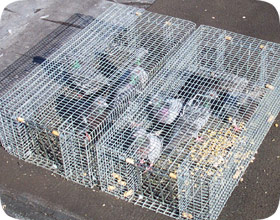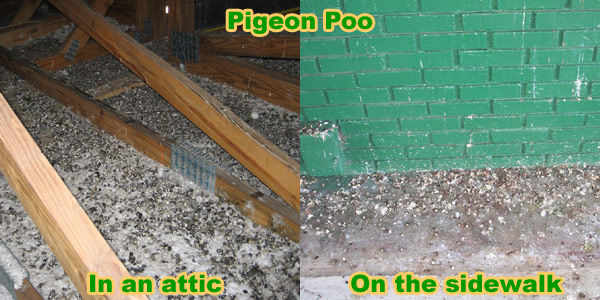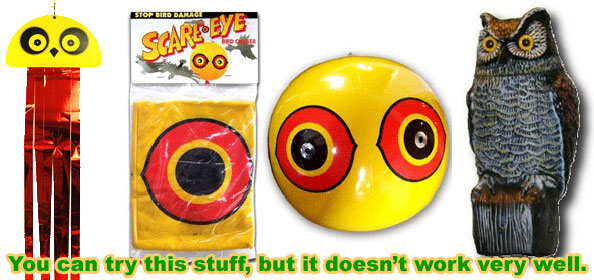- info@wildlife-removal.com
Call us for help in your town
Wildlife Removal Education
Pigeon Removal and Control
Need pigeon removal in your hometown? We service over 500 USA locations! Click here to hire us in your town and check prices - updated for year 2021.
 Pigeons are usually classified as a pest species because they are filthy gutter birds that inhabit cities, roost everywhere, and crap all over everything. The most common complaints include the following:
Pigeons are usually classified as a pest species because they are filthy gutter birds that inhabit cities, roost everywhere, and crap all over everything. The most common complaints include the following:
- Pigeons roosting on building
- Pigeons nesting INSIDE buildings
- Pigeon poo all over everything
Need professional help? Click here for my Nationwide List of Pigeon Trappers
Pigeon removal information -
Pigeons are a species of bird that are seen in every place on Earth, with the exception of remote islands and Antarctica. With a species this prevalent in the world there are bound to be some interference between humans and these feathered creatures. Pigeons are often associated with city parks, bridges and any man-made structure because this is where the make their roosts. Pigeons live around people because humans have become one of the main sources of their food. They eat the seeds and grains that we throw at them or put in our bird feeders. With food as accessible as that, why live anywhere else?
If you wish to trap pigeons, read my how to trap pigeons page. But beware, trapped and relocated pigeons return, so you have to euthanize (kill) any trapped pigeons.
Pigeons have the tendency to live very close to humans and make their homes near or on our homes which is when they become a pest rather than a tame bird that lives outside. You can even find
pigeons in the attic. Pigeon droppings contain uric acid which has very corrosive properties. In fact, their droppings are so damaging that they can strip the finish off of your car in a matter of months
and eat through steel in only a few years. Many of our bridges and steel structures like skyscrapers are falling into disrepair because state budgets cannot keep up with the corrosion. Pigeons can also contaminate food with their droppings when make
their nests in food packaging plants. Read more about diseases from pigeon droppings or read about diseases pigeons carry. If you have a pigeon problem you probably want to get rid of them as quickly as possible. Find out how to recognize symptoms of a sick pigeon. Here are some suggestions to help you do that:

Professional bird control can be very costly, because it usually involves the installation of a large amount of physical barriers like netting, spikes, or shock track. It is serious property modification work. Read more about How Much Does Pigeon Removal Cost?
• Your best defense against pigeons is to exclude them from entering the places that you do not want them whether this is your barn or a food packaging plant that you work in. Using netting or just going around the place and filling in any holes can do wonders for lowering the pigeon population. There are many of these products in garden centers and in hardware stores. Pigeon Prevention Tips: How to Keep Pigeons Away.
• Using spiked landing strips that you can pick up at nearly any hardware store is your second best defense against pesky pigeons. These strips do not hurt the birds, but make the surfaces that they would normally roost on uneven, which makes it difficult for them to construct nests or perch comfortably on the ledge. These are usually inexpensive and easy to adhere to the problem perch areas.
• Tacky chemical sprays are very effective in discouraging pigeons from landing on certain ledges. This chemical is sprayed on a surface which makes it sticky and uncomfortable for the birds to perch on. This spray is safe for the birds, but difficult to get off any surface that you put it on. Do not use a spray as a first choice but as a last resort as it is often unnecessary and messy. With that being said, the sticky spray is a good choice for bridges or high-stakes buildings like tall scrapers and food plants.
• As a method of last resort, you can kill pigeons. You can do this through shooting, most commonly. Poison is a bad idea. You can read more about how to kill pigeons here.
• An easy and inexpensive method to get rid of pigeons is to use copious amounts of spices on the ledges where they like to roost. Apply the spices generously and put more down after it rains or there have been strong winds. Spices that you can try include cayenne pepper, black pepper, garlic, onion powder, chili powder and cumin. Any strong scented spice will do the trick.
• Pigeons hate water and you can use sprinklers and other motion activated water devices to scare the pigeons away. This works as a short term
pigeon removal tactic and deterrent, but if you are consistently using it the pigeons will eventually learn that they don’t want to be near that area anymore. Pigeons are very smart and can memorize where they are wanted and where they are not.

Read more about the ineffectiveness of Pigeon Repellent here, if you wish.
Or read about How to Get Rid of Pigeons.
FERAL PIGEON INFORMATION
Pigeons are a variety of bird that includes many species that are found almost everywhere in the world, but we are discussing the feral pigeons commonly found in urban areas. The only place that you will not find pigeons is on remote islands and in very cold climates. Generally, pigeons are fat birds that occupy city streets, but they can come in a variety of colors such as white and gray, gray and black, green and gray or any combination of the two depending on what subspecies it is.
Pigeons are strong and powerful fliers making them very hard to catch or control. Their wings give them the ability to dodge and escape from city dwellers and the occasional domestic cat. They are a very successful species of bird that adapts well to urban areas. Pigeons live in roots or nests that they can make anywhere; on a bridge, on your balcony or in a tree. These nests are not very sturdy and have to be constantly repaired or completely rebuilt.
Pigeons will mate for life after a courting period of where bobbing the head is very important to show superiority. A female will lay only two eggs that have a pearlescent hue to them that she will incubate at night and he will incubate during the day. The incubation period usually lasts anywhere from two to three weeks and the hatchlings will stay in the nest for another twelve to eighteen days. The young will then be taught how to fly and kicked out of the nest.
Pigeons subsist on a diet of seeds and fruit. The seeds are usually a grain type of seed and the fruit they eat are any fruits that are found in the wild. Pigeons will also eat some insects and worms when they are available, but these birds do not actively hunt them. Pigeons have a very short digestive tract or intestinal tract and cannot handle much more than a grain or a seed. This is one of the perils of pigeons living in urban areas because they can accidentally eat our food and it hurts their gastro-intestinal system. Rice is one of the major bird killers because of its tendency to expand in the stomach, so if a pigeon eats too much rice it can actually burst or rupture the stomach lining. This is why it is illegal to throw rice at weddings, but instead it is permissible to throw bird seed.
Pigeons have been proven to be very intelligent in research trials. They have the ability to solve puzzles and have a good working memory. For example, they are very good at learning that if they perform a specific action, then they will receive a treat or a negative experience such as a shock. This is very important to research because it helps us learn how human’s memories work without conducting research trials on actual humans.
Pigeons usually have no effect on the human environment, except for their droppings. The droppings of pigeons have a very corrosive effect on even the most resilient of metals. This creates a major problem for structures such as skyscrapers and bridges. Often bird droppings can eat through a fresh coat of paint in only a few months to a year, and without a budget to keep up with the repairs, many of our bridges become neglected and dangerous.
Read more About Pigeons.


















